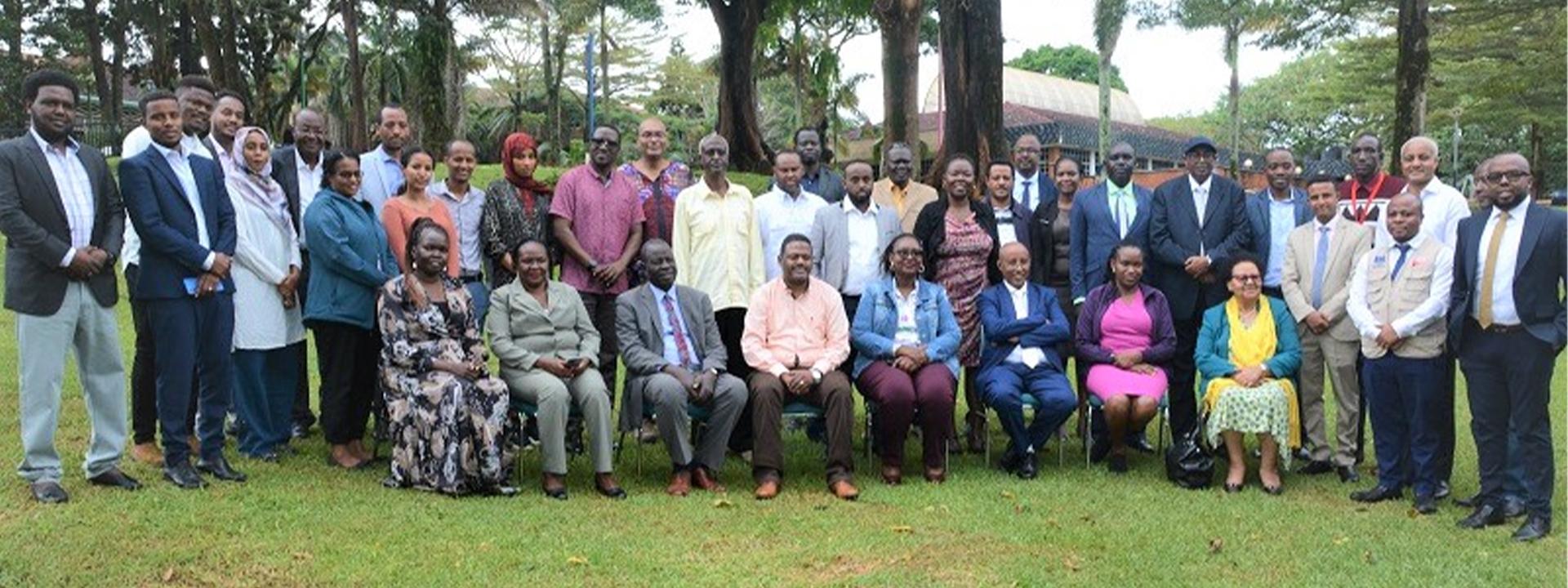March 20, 2023 (ENTEBBE, Uganda): The Inter-Governmental Authority on Development (IGAD) under the Health and Social Development Division this morning kickstarted a technical and stakeholder consultative meeting on the draft Protocol for Rapid Assessment on Human Rights and Gender related barriers to Tuberculosis (TB), HIV and COVID-19 access services within the refugee settlements in the IGAD Region. The assessment is also aimed to provide recommendations for improved TB and COVID-19 services.
The Rapid Assessment will be conducted in 67 selected camps in five IGAD countries: Djibouti, Ethiopia, South Sudan, Sudan and Uganda between March and April 2023. The refugee settlements have been selected purposively with the consideration of; Refugee population size; Representation of the origin of the refugees in the host countries; number of notified TB cases in 2022 and Ease of Transport service. Study Assessment recommendations will be in all the 67 settlements in all the other IGAD Member States between May and December 2023.
The IGAD Member States host more than 4.4 million refugees in 72 refugee camps/settlements and 1.3 million Internally Displaced Persons (IDPs) majorly due to the prolonged political unrest, wars, violent extremism, and natural disasters prone in the region. Due to great high numbers, many are at great are at risk of TB infection and Active TB progression due to overcrowding, poor shelter, poor nutrition and living conditions with no adequate data or documented evidence on human rights and gender related barriers to TB services in the refugee camps /settlements in the region.
The opening was officiated by IGAD’s Senior Health Program Coordinator; Dr. Tsegay Legesse on behalf of the Director of Health and Social Development invited the participants and highlighted the achievements of the Global Fund grant to IGAD in improving the TB and HIV/AIDS services in the refugee camps since 2017 in collaboration with UNHCR and other partners. He pointed out that the COVID-19 pandemic had reversed achievements in TB management and exaggerated human rights and gender inequalities in the region.
“IGAD is committed to scale up services and I call upon national governments, UNCHR and other partners that will help mitigate the barriers of access health service in refugee settings to support evidence generated from this Rapid Assessment for \recommendations to inform and address human rights and gender barriers for improved up take of TB and COVID-19 services in the region. We call upon your meaningful engagement and support to undertake the assessment jointly and ensure the reliability and quality of the assessment” Dr. Legesse added.
On her part, Ms. Darlson Kusasira, Community Services Officer – Department of Refugees at the Office of the Prime Minister in the Republic of Uganda welcomed the participants and commended IGAD, UNHCR and other partners’ efforts towards the provision, access, improved TB and HIV services in order to create awareness, mitigate the stigma related to TB, HIV and gender related barriers as a way of strengthening in-country and cross border collaboration.
“We need to address policy barriers and other related national support services towards the prevention of COVID-19 and mitigation of its impacts on the TB programming that live on within the refugee settings that this study will achieve through the Protocol” Ms. Kusasira concluded.
According to the Terms of Reference of the assessment the projected outcome of the qualitative study is to develop a Study Protocol with the oversight of a committee that will provide technical consultation on methodology, purposive sampling and data collection tools as a way to ensure the reliability and quality through the engagement with service providers in the refugee settings.
The meeting is being attended by experts and stakeholders from the Office of the Prime Minister (OPM) – Refugee Affairs of the Republic of Uganda, UNHCR, Sub recipients , sub- sub recipients, Commission of Refugee Affairs, National Tuberculosis Program as well as Health, Gender, Legal and Transnational crime experts from IGAD and consultants from different countries for a common understanding about the purpose of the assessment among the different actors in the refugee settings and facilitate to get wavier and ensure engagement and participation.
The Protocol Consultative study is with the support of the Global Fund-IGAD grant under their 2022-2028 Global fund strategy to “Promote and Protect Human Rights and Gender Equality’ to strengthen the capacity for Tuberculosis and Multi drug resistance Tuberculosis diagnosis and TB (TB/HIV) service provision as well as mitigate the impact of COVID-19 on the TB programs that are within the refugee setting with emphasis on cross border health facilities in the IGAD Region.

